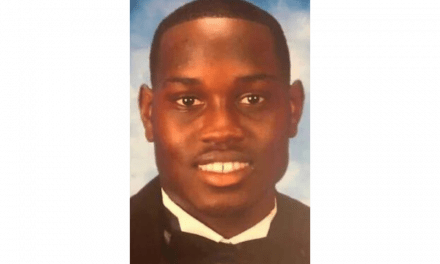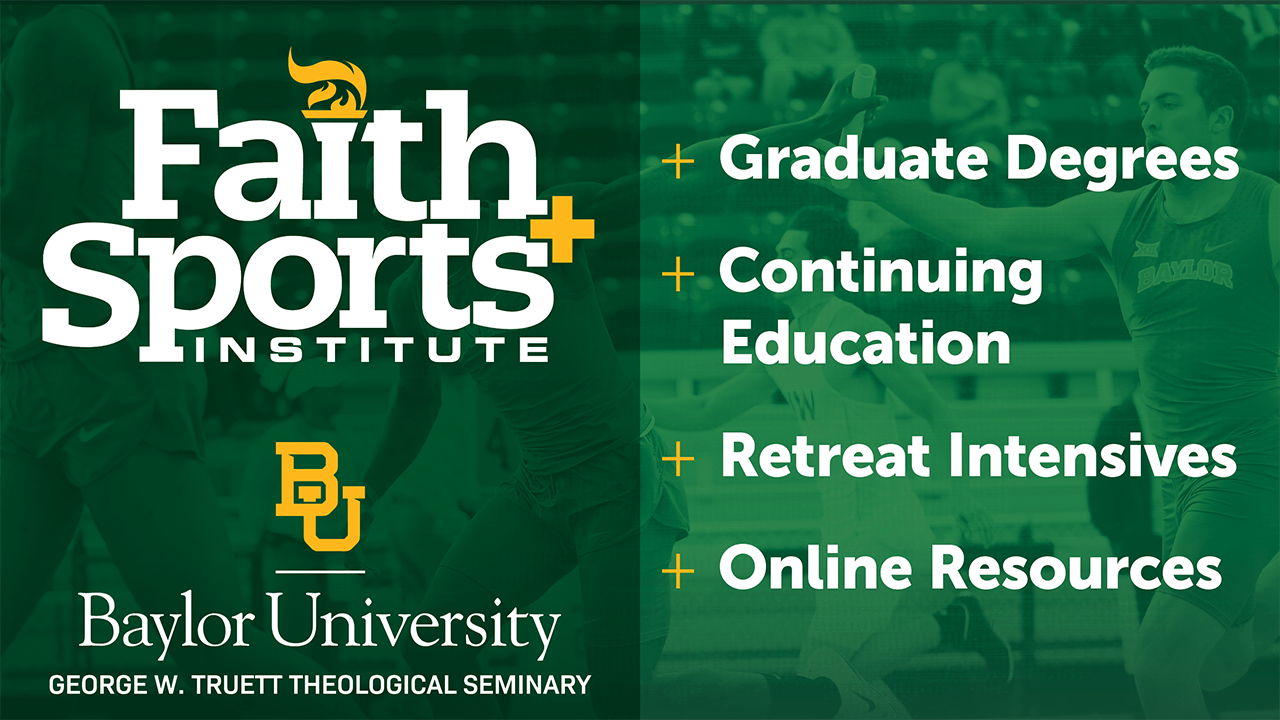What does it look like when your Christian faith informs how you participate in sports?
John and Cindy White have been thinking about that question for a long time. Their reflections and experiences, honed over the years during their time in sports ministry, eventually led them to launch the Faith & Sports Institute (FSI) High School Retreat in 2018 with a direct mission: They want to “redefine greatness” by teaching high school student-athletes what it means to be truly great in sports and life according to a Christian perspective.
In 2021, Truett Seminary graduate and current doctoral student in psychology Elizabeth Bounds sat down with John and Cindy to talk with them about the philosophy, principles, and practices of the retreat—the who, what, where, when, why, and how.
Check out the conversation below to learn what it’s all about. And when you’re done, visit the FSI Retreat home page for more!
Elizabeth: What was your motivation for starting the FSI Retreat?
Cindy: Having competed and coached at a high level, and having worked with college athletes and coaches, we have seen the tremendous benefit of learning how faith in God can shape your character, motivations, relationships, and leadership. Sports are such a grind, and, if you’re anything like me, you probably love nearly every moment of it! But what we’ve seen over the years is that for many sports have become a treadmill, non-stop and no time to think. We’ve forgotten the reasons why we do what we do. The FSI Retreat is a place to slow down, reflect, and learn how a right perspective in sports can restore your joy of competing. We want our athletes to lean into the reason God has them here in the first place, to love and serve others because he first loved us.
John: And to add to that, Christians in general and youth in particular often don’t take the time to consider how God encounters and ministers to them in ordinary life experiences. Sports are a perfect example of that. Our focus is to help youth understand sports and faith as connected rather than as separate. We started the FSI Retreat because we wanted to create a space where youth can freely ask and intentionally explore the big life questions, and they can do this in and through the sports they love. Both faith convictions and sports can be understood better when placed in dialogue with each other. Both faith and sports deal with what it means to be human. Both are complex. It is difficult for us all, including youth, to discern what is good, bad, and in-between about sports. So, we wanted to create a space where youth could explore the ways their faith informs their participation in sports.
So, it sounds like you witnessed some aspects of life and sports that are broken, and you wanted to offer a theologically driven solution. Can you say a little more about your vision for the intersection of faith and sports?
John: All too often, we reserve our faith for Sunday mornings. We do church and God-related things on Sundays, and then the other six and a half days of the week are devoted to worldly pursuits. We want to debunk this false divide between what is sacred and what is secular. God is present in all our activities, including sports. God not only encounters us in sports, but he also cares about sports and how we participate in them. Research indicates that for many contemporary youth, their view of God is someone who’s distant, someone who’s uninvolved except when they get in trouble, and that God’s primary concern is for them to behave certain ways, and for them to live a happy life.
We want to teach youth that God cares about what they’re doing and is present with them in it. And with that understanding, Christians should look and play differently than the rest of the world. So, this means that God cares about how we take care of our bodies. What I eat and drink, how I train, and what I do with my injured body all matter to God. God cares about how we treat our teammates. It’s more than being kind but pushing others towards excellence while still being positive. God cares about our effort. Am I going to slack off for the last part of my run, or will I offer up my effort as worship to God? You know that your faith works by how it animates and permeates every area of your life, including how you train and compete.
Cindy: We’ve also seen how athletes, just like the rest of our culture, are busy, busy, busy. So, this idea that God is present in all you’re doing should be a relief. Because it’s not about adding more, but just bringing God into everything you’re already doing and allowing him to be a part of it. But too often there is a fundamental misunderstanding of who God is and what he cares about. Who is God? Is he good, gracious, loving, and close to us? Or is he aloof, distant, and conditional? Where is God? Is he with you right now in this training, in this weight room, in this game? If so, we have a source of strength, acceptance, and peace to draw from as we compete.
Why is it valuable to work with high school student-athletes? What is it these adolescents need and are searching for?
John: Churches often feel conflicted about how much time, energy, and attention Christian youth devote to their sports. Rather than reject or simply accommodate their athletic commitments, we believe that we should engage student-athletes at a critical period in their own development in something that’s important to them. Why not bring seminary to sports so student-athletes, who are already leaders in many ways, can grow in their Christian convictions and character at such an important time in their faith formation? They can become leaders on and off the field.
Cindy: High school athletes are the next generation of leaders, but they don’t always feel like they are. We live in a very broken and polarized world. Anxiety, depression, loneliness, and addictive behaviors are very much a part of their story. Like all of us, youth want to be seen and heard, believed in, encouraged, and equipped. Social media isn’t really helping get them to where they want to go, to have meaning and purpose, love and connection. FSI wants to lead from the ground up by offering hope, love, and purpose through our retreat and mentorship.
What do the youth learn at the FSI Retreat and how do they learn it?
John: We very intentionally start with who God is. Our perception of God determines our perception of everything else in this world, ourselves, our activities like sports. To paraphrase A.W. Tozer, the most important thing about us is what we think about God. So, we begin with the virtue of faith exploring the question, “who is God?” Ultimately, God is the only one worthy of our worship. So, we help the youth view sports as an opportunity to worship God, just like they would in church or youth group. Learning to ascribe worth to God as you run, compete, sweat, dribble, swim, and shoot is very practical and rewarding.
Cindy: With this concept of faith, we teach our athletes what it really looks like to worship God in sports and how to invite God into their competition. For most, these are new concepts! They thought God was reserved for church or youth group and not the everyday stuff.
John: Then, we move to a theological understanding of our own identity and consider the virtue of love. This is important, because so many athletes derive their sense of value and worth from their athletic performance. But we teach them that they are unconditionally loved and accepted.
Cindy: That they are loved for who they are, not what they do.
John: If the Christian life is about how much God loves us, then youth can operate from God’s love instead of for it. God’s love frees them from the worry and anxieties of trying to prove themselves to friends and family so that they can more fully give of themselves to others in sports. Helping youth to recover the joy and beauty of play, which is fundamental to all sports, encourages them to value sports and life for what is good rather than merely useful.
Cindy: They also learn that in order to be a great-souled person they have to train spiritually just like they do in their sports. Because what one invests in is really what is important to them. They learn that sports are a laboratory to practice and grow in all areas of life. This is the virtue of discipline. Then we explore how we can respond to suffering and life’s inevitable trials, leaning into our only source of true hope. Finally, we talk about the virtue of courage, which is, essentially, the fuel you need to be able to live out all the other virtues of faith, love, discipline, and hope.
John: As far as how we go about teaching these five virtues, we are really intentional about our pedagogy. We intentionally call this the FSI Retreat, and not a camp. The idea being that we are carving out space, retreating from the hustle and bustle of everyday life, in order to encounter God. Our retreat is almost like a giant mindfulness exercise, taking youth off autopilot to really step back and critically engage with these ideas. We give the youth time and safe spaces to ask the big life questions and explore their own experiences, emotions, and stories. The FSI Retreat is true immersion, experiential learning; a resting place to renew our identities and reorder our love of God and others. The youth receive information, they process in small groups with a mentor, and then they compete in a variety of sports as application. We prioritize active learning and reflection, the combination of contemplation and competition.
Cindy: Going off of what John said about the nature of a retreat, you have to have somewhat of a disruptive experience to wake up. The Retreat is disruptive because it’s a different type of learning. You’re not just sitting in church passively receiving information. This is experiential learning at its best. It’s a combination of experience, reflection, and action. Athletes are so busy that they rarely have time to reflect about what they think about God, how they feel, or their motivations. We give them time and permission to ask questions and explore their own stories. We ask hard questions and push youth to name and consider their emotions. We’re actually interested in them as human beings. It’s shocking for some youth that we’re interested in them, the mentors are interested in them, and God is interested in them.
John: So, we teach the virtues of faith, love, discipline, hope, and courage and then allow them to literally practice in competition what that means, what it looks like. For example, when a ref makes a bad call or your teammate really messes up and loses the game, what are you going to do? Take your anger out on him or her? Or are there better ways to handle injustices? So, when life throws you curve balls or some really hard stuff, maybe knowing there is a God who sees you and cares and can walk you through hard situations can provide hope.
I can tell you’re passionate and intentional about both your message and delivery system! You’ve both mentioned year-long mentoring. Can you say a little bit about the mentorship piece of the FSI Retreat and how that fits into your overall mission?
Cindy: Mentors are former athletes and coaches who understand sports culture, have deep faith, and are eager to walk alongside younger athletes. Our mentors walk the walk and live out everything we teach the student-athletes. We train our mentors to enable them to be good listeners and encouragers. We look back at our lives, and authentic discipleship was so crucial. You need someone who checks in on you and cares about you and is interested in you, someone outside of your family. Mentors are a sort of compass, helping students to navigate life’s challenges at home, in relationships, in school, and in their sports. So, our mentors commit to walking with student-athletes for the entirety of the retreat as well as a full year after.
John: To add to that, retreats are important but they’re short-lived. The mentor piece allows for further reflection, daring conversations, and extended safe spaces even after the retreat is over. Christian mentorship is all about helping others become followers of Christ, and that requires regular connection. Research has shown that community and accountability are key to retention following mountaintop experiences. Having a mentor helps to ensure that what they learn sticks with them after the highs of the retreat fade and the normal routines of life set back in.
What’s a normal day look like at the FSI Retreat?
John: It’s not a sports camp and it’s not a Bible camp. We move to a slightly different beat. Youth can expect to make new friends as they experience engaging worship, interactive teaching, challenging competition, courageous conversations, and small groups led by a mentor.
Cindy: Each day is action-packed! Youth hear talks from former athletes or coaches or professors, then process the information in small groups with a mentor. After the small group discussions, the competition begins! Youth are challenged intellectually, emotionally, physically, and spiritually. We also enjoy eating all together and getting to know students from other schools. The evenings are reserved for talking about real life and the struggles we experience.
Last question. In a short phrase, what is the big take-away you hope these adolescent athletes leave the Retreat with?
John: We have to get God right to get sports right. And if we can figure out how to pursue excellence and cultivate Christian virtues in sports, then we will learn how to be truly great in life.
Cindy: We want the students to know and experience God’s love so that they can love themselves and others more deeply. We want the students to know that God cares about their sport because He cares about them. We want them to know that they are called to be great by living a life of love and service to others.

From left to right: John White, Elizabeth Bounds, and Cindy White. Photo taken during the 2021 FSI Retreat at Baylor University.





